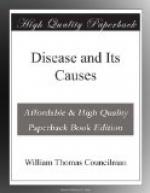of spores. A fluid environment is essential to
the life of the protozoa, but the resistant forms
can endure long periods of dryness or other unfavorable
environmental conditions. The universal distribution
of the protozoa is due to this; the spores or cysts
can be carried long distances by the wind and develop
into active forms when they reach an environment which
is favorable. Their distribution in water depends
upon the amount of organic material this contains.
In pure drinking water there may be very few, but
in stagnant water they are very numerous, living not
on the organic material in solution in this, but on
the bacteria which find in such fluid favorable conditions
for existence. The food of protozoa consists chiefly
of other organisms, particularly bacteria, and they
are classed with the animals. The protozoa are
the most widely distributed and the most universal
of the parasites. The infectious diseases which
they produce in man, although among the most serious
are less in number than those produced by bacteria.
So marked is the tendency to parasitism that they
are often parasitic for each other, smaller forms entering
into and living upon the larger. Variation does
not seem to be so marked in the protozoa as in the
bacteria, though this is possibly due to our greater
ignorance of them as a class. We are not able,
except in rare instances, to grow them in pure culture,
and study innumerable generations under changes in
the environment, as the bacteria have been studied.
If we regard the living things on earth from the narrow
point of view as to whether they are necessary or
useless or hostile to man, the protozoa must be regarded
as about the least useful members of the biological
society. It is very possible that such a conclusion
is due to ignorance; so closely are all living things
united, so dependent is one form of cell activity
upon other forms that it is impossible to foretell
the result of the removal of a link. The protozoa
do not seem to be as necessary for the life of man
as are the bacteria; they produce many of the diseases
of man, many of the diseases of animals on which man
depends for food; they cause great destruction in plant
life, and in the soil they feed upon the useful bacteria.
It is well to remember, however, that fifty years
ago several of the organs of the body whose activity
we now recognize as furnishing substances necessary
for life were regarded as useless members and, since
they became the seat of tumors, as dangerous members
of the body. The only organ which now seems to
come into such a class is the vermiform appendix,
and its lowly position among organs is due merely to
an unhappy accident of development.




